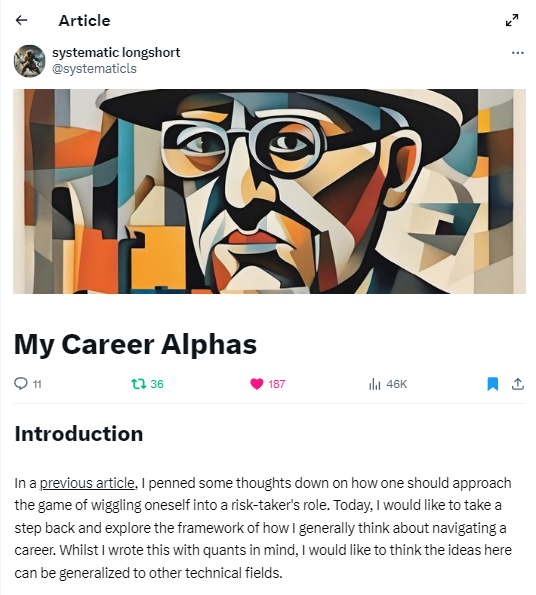Systematic LS - My Career Alphas - Article Review
So a while back about 5 months ago, I came across possibly the best article or source on career advice that I had ever seen. I figured to do a review/reflection on the article for myself and for the blog purposes. And here it is:

SystematicLS is a PM at a L/S equity stat arb pod shop. It just so happens he has incredible clarity and life alpha on how one should approach a career, and generalizing that, how one should approach goals. This article literally changed by life. If I found this before uni, I would have quit my current course and enrolled in the hardest courses possible: one or more CS, math or physics. I would have done things alot differently.
Goal Setting: Procure a Tether to the End Destination
“First think deeply about where is it you would like to go, and what is it you would like to do.”
In this part, he says you should clearly identify some terminal or end goal in your career. Okay nothing revolutionary so far.
Careers are Random Walks with Path Dependency
“Our Careers are random walks with a drift”
This is the key insight. Remember, you cannot control the daily, short term swings and variance a random walk, but in the long run, given enough willpower, you have agency to force a drift in the direction you want.
This generalizes to goal setting. So, I realized, you have to think long term and make long-term plans. This is where I want to go or be in X years. And then you plan and execute. Along the way, you will encounter the random variance (you cannot control), but if you keep drifting, you slowly achieve your goal.
There is also the element of path dependency, what is available to you as an opportunity is dependent on where you currently are. This means you need to think about how to drift in the direction of where you want to go, and how your first (next) job plays a role in that.
This insight provides a good framework for assessing choice of jobs.
“A good framework for decision making is probably thinking about the finality of opportunity cost and direction of drift your decision will bring you in”.
Obviously, when you evaluate your choice of next job, each path you take opens new doors and closes others, forcing you to drift in a direction. And you have to carefully think about this. And this is expressed in what I think is the most elegant piece in the article:
“The best kind of drifts are in the direction of your goal, the second is where at least one component of your displacement vector is in the direction of your goal, and then there’s orthogonal to your goal, and worst, opposite to your goal”.
A common problem would be to get stuck in a job where the last scenario happens: orthogonal or in the opposite direction. And time is finite, so the longer you remain, the faster you need to accelerate in the right direction in your next job.
Communication to Superiors - Information and Efficiency
“Keep your head down, work hard, and you will be rewarded is arguably one of the worst career advice I have ever heard, and yet it is rampant. Don’t get me wrong, I think it’s a very soothing proposition. The idea that I could only focus on what I find intrinsically interesting, and everything else would work for me? What a delicious idea, but unfortunately, the cake is not real.”
Each layer of management your information (about your work) goes through, the signal loses information and becomes noisier:
“There are places where this problem is being solved at a management/cultural level, but for most places, efficiency of information propagation is inversely proportional to the number of layers to management. It is more likely that you are working in such a place than a lean mean fighting machine whose culture is opposed to hierarchy.”
To avoid this, he provides a nice framework when communicating your work:
- Give people the option of a summary. Summarize what you’ve done in a few short points
- Order things by importance.
- Results are most important. Processes are non-trivial but they should be an appendix.
Conclusion
And that is the summary of the article. Beautifully written and radically changed my way of thinking about careers. And the best part is that it generalizes to achieving goals in real life too.
The next time you have a setback to things out of your control, don’t lose focus and stay in the direction of your desired drift. The next time you apply for a job on LinkedIn, remember path dependency and opportunity cost. This is ‘life alpha’ - wisdom from a veteran of the game.